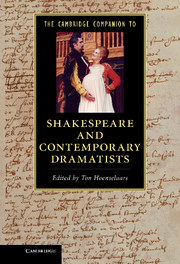Book contents
- Frontmatter
- Contents
- Illustrations
- Contributors
- Preface
- Chronology of the life and work of Shakespeare and contemporary dramatists
- 1 John Lyly and the University Wits
- 2 Thomas Kyd and the Elizabethan blockbuster
- 3 ‘The words of Mercury’
- 4 The dyer’s hand
- 5 Urbane John Marston
- 6 Thomas Dekker and the emergence of city comedy
- 7 Shakespeare
- 8 Thomas Heywood
- 9 George Chapman’s learned drama
- 10 Francis Beaumont and John Fletcher’s tragicomedy as musical melodrama
- 11 Thomas Middleton and the early modern theatre
- 12 John Webster
- 13 John Ford
- 14 Philip Massinger
- 15 Richard Brome and the idea of a Caroline theatre
- 16 Troublesome histories
- Select bibliography
- Index
- References
11 - Thomas Middleton and the early modern theatre
Published online by Cambridge University Press: 05 December 2012
- Frontmatter
- Contents
- Illustrations
- Contributors
- Preface
- Chronology of the life and work of Shakespeare and contemporary dramatists
- 1 John Lyly and the University Wits
- 2 Thomas Kyd and the Elizabethan blockbuster
- 3 ‘The words of Mercury’
- 4 The dyer’s hand
- 5 Urbane John Marston
- 6 Thomas Dekker and the emergence of city comedy
- 7 Shakespeare
- 8 Thomas Heywood
- 9 George Chapman’s learned drama
- 10 Francis Beaumont and John Fletcher’s tragicomedy as musical melodrama
- 11 Thomas Middleton and the early modern theatre
- 12 John Webster
- 13 John Ford
- 14 Philip Massinger
- 15 Richard Brome and the idea of a Caroline theatre
- 16 Troublesome histories
- Select bibliography
- Index
- References
Summary
The Oxford Middleton assigns thirty-two plays to Thomas Middleton either as sole author or co-writer or reviser. Middleton was a versatile playwright, who moved between different acting companies throughout his career, experimenting with the latest fashions in plays, from sharp comedies set in Jacobean London to baroque revenge tragedies. From James I’s accession to 1606, he wrote a series of comedies for the Children of Paul’s, tailoring his plays to an all-boy acting company performing in an indoor playhouse, and to the audiences that congregated in the fashionable theatre district. He was also selling plays to the King’s Men at this time, including A Yorkshire Tragedy (c. 1605), The Revenger’s Tragedy (1606), and Timon of Athens (c. 1606), co-written with William Shakespeare, whose Macbeth (1606) and Measure for Measure (1604–5) he also substantially revised, in 1616 and 1621 respectively. Middleton consolidated his reputation in the 1610s with The Roaring Girl (1611), co-written with Thomas Dekker, and A Chaste Maid in Cheapside (1613). The early 1620s were the high-point of his career: he wrote his major tragedies, Women Beware Women (c. 1621) and The Changeling (1622), the latter co-written with William Rowley, and he regularly produced mayoral pageants for the City of London. His last play, A Game at Chess, was his most sensational play, and its popularity, coupled with its political topicality, meant that it was Middleton’s last play performed on the public stage.
What is most notable about Middleton when surveying the range of his works is his versatility. Middleton, jestingly, likened the playwright to the tailor who works with an eye to the fashion.
- Type
- Chapter
- Information
- Publisher: Cambridge University PressPrint publication year: 2012

